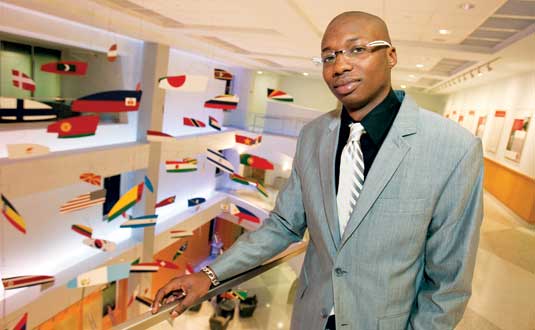Fox entrepreneur plans to nourish his native land
 |
| Courtesy Joseph V. Labolito / Temple University |
|
It’s a simple concept: erase the problem of poverty and hunger. Fox School of Business student Mohamed Ali Niang, a 21-year-old entrepreneurship and international business economics major, envisioned Malo Traders, a business to make that simple concept a reality. Originally from the West African nation of Mali, Niang and his brothers designed a plan to help Malian rice farmers protect and retain more of their crop, boosting their income and alleviating hunger in a country that is one of the poorest and malnourished in the world. In just a year, Malo Traders has become a refined business plan that is a strong competitor in four internationally renowned social entrepreneurship competitions. Witnessing the problem first-hand Niang attended the Centre d’Etudes Franco-Americain de Management in Lyon, France, one of the Fox School’s international partners. Before coming to Philadelphia to finish his degree, he gained business experience by interning at the United Nations Food and Agriculture Organization and in a renewable energy company in Mali. During a field mission in Mali’s biggest rice producing region, Niang witnessed first-hand the wastage and spoilage of rice harvested by small-scale farmers. Opportunistic businessmen swindled them out of making any profit on their rice — a staple crop in a country where 80 percent of the labor force works in agriculture — because — the farmers lacked the bargaining power that comes with having appropriate storage facilities and processing equipment. “It’s unacceptable, because our country suffers from food insecurity,” Niang said. “We’re wasting about 7 percent of our rice production, estimated at $20 million, because we’re not capable of building a warehouse.” The lack of infrastructure puts Mali among the 25 poorest countries in the world, with 30 percent of its population below the poverty line. Niang arrived at the Fox School in fall 2009 and proposed Malo Traders, a “not-just-for-profit” company that minimizes post-harvest losses by partnering with farmers to protect, process, package, store, label and market rice. Working with Temple’s Innovation and Entrepreneurship Institute (IEI) and building a management team composed of his father as a senior adviser and Niang’s siblings as key stakeholders, Niang developed a three-year plan to increase the farmers’ average annual income of $520 by 10 percent. “Any given year, you’re lucky to have two or three students like Mohamed,” said Jaine Lucas, IEI’s executive director. “What makes him really special, besides the philanthropic aspect of his venture, is just a tremendous level of sophistication and focus.” Giving a voice to Mali Fox instructor Dwight Carey has acted as Niang’s main mentor throughout the entire process. Carey, who has years of experience working for rice, flour and sugar companies, said he is confident that Niang’s model could extend beyond Mali. “It’s not a high-tech business,” Carey said. “But there’s real value in what he’s doing. Mohamed has the answer.” Niang and his brother Salif, a doctoral student in international relations at Purdue, have entered Malo Traders in four national and international entrepreneurship competitions to gain exposure and funding for the venture. Malo Traders was one of only 13 proposals out of 161 submissions selected for the final round of the University of Washington’s Global Social Entrepreneurship Competition. Likewise, Malo Traders represents one of 18 business plans out of a pool of 100 in Harvard’s Pitch for Change semi-finals. Malo Traders is the only social entrepreneurship venture competing in both. The business plan has also advanced in the University of California, Berkeley, Global Social Venture Competition regional semi-finals, as well as the Sparkseed Social Innovation Competition. “Growing up, we witnessed a lot of poverty,” Niang said. “It doesn’t make sense. As long as there’s hunger, poverty that’s unjustified, that’s due to lack of entrepreneurial spirit, we will tackle that problem.” —Julie Achilles for the Temple Times |